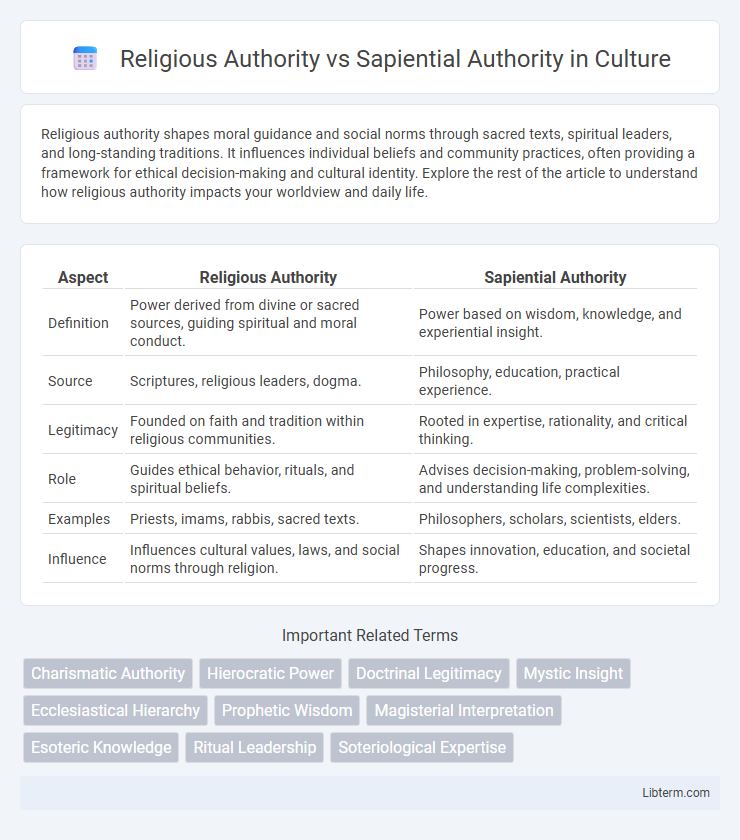Religious authority shapes moral guidance and social norms through sacred texts, spiritual leaders, and long-standing traditions. It influences individual beliefs and community practices, often providing a framework for ethical decision-making and cultural identity. Explore the rest of the article to understand how religious authority impacts your worldview and daily life.
Table of Comparison
| Aspect | Religious Authority | Sapiential Authority |
|---|---|---|
| Definition | Power derived from divine or sacred sources, guiding spiritual and moral conduct. | Power based on wisdom, knowledge, and experiential insight. |
| Source | Scriptures, religious leaders, dogma. | Philosophy, education, practical experience. |
| Legitimacy | Founded on faith and tradition within religious communities. | Rooted in expertise, rationality, and critical thinking. |
| Role | Guides ethical behavior, rituals, and spiritual beliefs. | Advises decision-making, problem-solving, and understanding life complexities. |
| Examples | Priests, imams, rabbis, sacred texts. | Philosophers, scholars, scientists, elders. |
| Influence | Influences cultural values, laws, and social norms through religion. | Shapes innovation, education, and societal progress. |
Defining Religious Authority
Religious authority refers to the recognized power or right of individuals or institutions to interpret, enforce, and guide adherence to religious beliefs, doctrines, and practices within a faith community. This authority often derives from sacred texts, traditions, or divine mandate, granting clerical figures such as priests, imams, rabbis, and pastors the legitimacy to lead worship and make doctrinal decisions. Distinct from sapiential authority, which is grounded in wisdom and philosophical insight, religious authority emphasizes obedience and spiritual governance based on faith and revealed knowledge.
Understanding Sapiential Authority
Sapiential authority derives from wisdom, experience, and intellectual insight, emphasizing personal discernment and cognitive depth over formal institutional power. It is often found in philosophers, scholars, and sages whose influence stems from their profound understanding of complex moral, spiritual, or existential matters. Unlike religious authority, which relies on doctrinal legitimacy and hierarchical structure, sapiential authority commands respect through demonstrated knowledge and practical wisdom.
Historical Perspectives on Authority
Religious authority historically derives from sacred texts, clerical hierarchy, and divine sanction, shaping societal norms and governance within various cultures. Sapiential authority emphasizes wisdom, philosophical inquiry, and intellectual traditions, often rooted in the teachings of ancient scholars and academies such as those of Aristotle, Confucius, or the Buddhist monastics. Throughout history, the tension between religious and sapiential authority influenced legal systems, educational institutions, and political power, reflecting broader cultural shifts between faith-based and reason-based epistemologies.
Sources of Legitimacy: Divine vs. Wisdom Traditions
Religious authority derives its legitimacy primarily from divine sources such as sacred texts, revealed doctrines, and transcendent mandates perceived as originating from a higher power. Sapiential authority, in contrast, gains legitimacy through accumulated wisdom, experiential knowledge, and philosophical traditions that emphasize rational insight and practical understanding. The legitimacy of religious authority is anchored in faith and divine revelation, while sapiential authority rests on reasoned interpretation and ethical reflection within human experience.
Institutional Structures and Leadership
Religious authority typically resides within hierarchical institutional structures such as churches, where formal roles like priests, bishops, and popes enforce doctrinal compliance and ritual observance. Sapiential authority, by contrast, centers on knowledge and wisdom, often emerging through scholarly communities or spiritual teachers who influence through insight rather than institutional power. Leadership in religious authority emphasizes obedience and tradition, while sapiential authority prioritizes interpretive expertise and philosophical understanding.
Modes of Knowledge Transmission
Religious authority primarily transmits knowledge through sacred texts, rituals, and hierarchical institutions that preserve doctrinal continuity and communal identity. Sapiential authority relies on experiential learning, wisdom traditions, and philosophical discourse, emphasizing personal insight and practical understanding over dogmatic instruction. Modes of knowledge transmission in religious authority are often formalized and collective, whereas sapiential authority values individualized interpretation and context-driven guidance.
The Role of Scripture and Oral Teachings
Religious authority often derives its legitimacy from sacred scriptures considered divinely revealed, which serve as the foundational texts for rituals, laws, and moral guidance within a faith community. Sapiential authority relies on oral teachings and wisdom passed through generations, emphasizing experiential knowledge, practical insight, and interpretive traditions that adapt to changing contexts. Both forms of authority interact dynamically; scripture provides fixed doctrinal frameworks while oral teachings enable evolving understanding and application of spiritual principles.
Authority in Community Formation
Religious authority shapes community formation by providing doctrinal guidance and moral frameworks that unify believers under shared spiritual beliefs and practices. Sapiential authority influences community cohesion through the transmission of wisdom and experiential knowledge, fostering critical thinking and ethical decision-making within the group. Both forms of authority integrate to create a balanced structure where faith and knowledge cultivate a stable and resilient communal identity.
Conflict and Dialogue Between Authorities
Religious authority, rooted in doctrinal teachings and institutional hierarchy, often clashes with sapiential authority, which derives from experiential wisdom and philosophical reasoning. These conflicting paradigms generate tension as religious leaders emphasize tradition and dogma, while sapiential figures advocate for inquiry and adaptive understanding. Dialogue between these authorities fosters mutual respect, enabling synthesis that reconciles faith-based directives with critical wisdom in contemporary ethical challenges.
Contemporary Relevance and Challenges
Religious authority, grounded in sacred texts and institutional traditions, faces contemporary challenges such as pluralism and secularism that question its exclusivity and interpretative power. Sapiential authority, derived from experiential wisdom and practical knowledge, gains relevance by addressing complex ethical dilemmas and fostering interfaith dialogues in diverse societies. Both forms of authority must navigate the tension between maintaining doctrinal integrity and adapting to evolving cultural and moral landscapes.
Religious Authority Infographic

 libterm.com
libterm.com